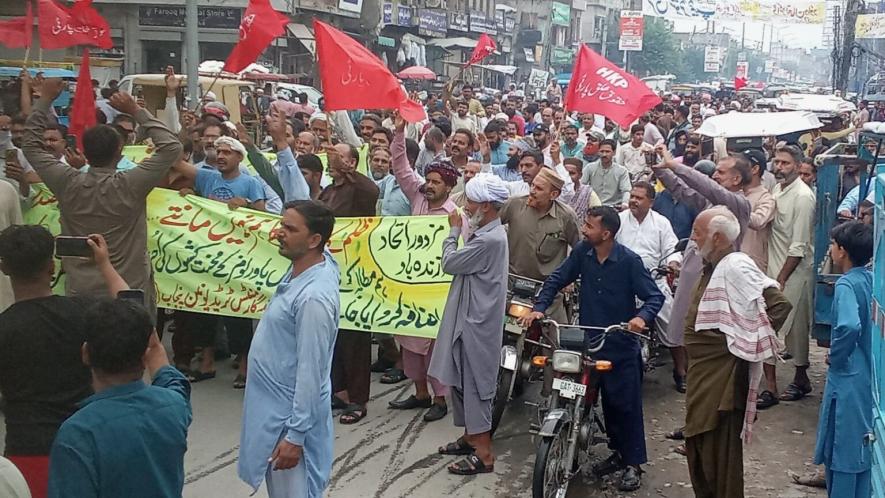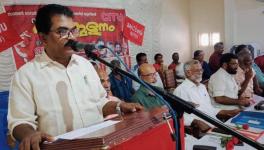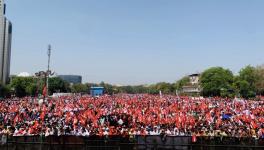Workers in Pakistan’s Punjab Fight for Basic Rights

Hundreds of workers are on strike in Gujranwala and Faisalabad against government failure to implement labour laws. Photo: Ammar Ali Jan/X
Thousands of power loom, textile, and kiln workers across Punjab’s industrial hubs of Faisalabad and Gujranwala have sustained protests since late July 2025, demanding the implementation of Pakistan’s increased minimum wage and urgent improvements to their working conditions.
The demonstrations, met with illegal factory lockouts by owners, mark a critical standoff between labor and capital in the region’s vital textile sector.
The unrest follows Punjab’s June 2025 budget announcement, which included a revised minimum monthly wage of Pakistani rupee 40,000 (140 US dollars).
Though considered highly inadequate by unions which had demanded a minimum wage of PKR 70,000 (245 US dollars), workers report persistent resistance from factory owners and local authorities toward implementing even the promised wage, a pattern compounded by deteriorating workplace safety and withheld benefits. This systemic non-compliance ignited the current wave of workers’ mobilization.
The workers, particularly in Faisalabad’s power loom sector, which employs roughly 25% of Pakistan’s textile workforce, endure severe conditions:
- Insufficient wages, often below PKR 15,000 per month
- 12-hour shifts
- Hazardous working conditions plagued by electrical faults, fire risks, and absent safety protocols
Many are denied social security registration, blocking access to healthcare, pensions, and injury compensation, while kiln workers face a form of bonded labor through coercive advance payments.
Workers fight back after owners slash wages 30%
The immediate trigger came in July, when factory owners in Faisalabad and Gujranwala unilaterally slashed wages by 20-30%, citing global market pressures, while further neglecting safety and social security obligations.
Workers swiftly mobilized under the leadership of established labor organizations, the Labour Qaumi Movement (LQM), founded in 2003 to combat exploitation, and Haqooq-e-Khalq Party (HKP), a leftist socialist party of Pakistan.
Mass protests paralyzed industrial zones by mid-July. In Faisalabad, workers blockaded key corridors, chanting “Kam do ya jaan do!” (Give work or give death!), crystallizing five core demands:
- Implementation of the legal minimum wage
- Mandatory social security registration
- Immediate factory safety overhauls
- Abolition of bonded labor
- Formal union recognition
Factory owners retaliated with a lockout of over 300 factories in Faisalabad, chaining gates, freezing wages, and barring workers, a move later declared illegal by the labor court. Outcomes diverged sharply between cities.
In Gujranwala, weeks of strikes and protests forced local authorities to broker a provisional agreement, reversing the wage cuts and committing to address other demands. Strengthened by this victory, Faisalabad’s protests escalated.
Since August 1 to date, hundreds of workers, including significant numbers of women and children, have maintained continuous protests outside the Faisalabad Deputy Commissioner’s office, demanding state intervention.
Leading the effort is Baba Latif Ansari, LQM chairman and HKP Punjab president. Ansari, a former religious activist who redefined “jihad” as workplace justice and survived a 2014 assassination attempt by factory owners, today bridges grassroots mobilization with legal strategy for workers in Faisalabad.
The HKP amplifies the struggle nationally, challenging lockouts in courts and framing demands for state action against exploitation. Internationally, Punjab’s workers embody a global fight for dignity, resonating with global movements. A victory here could inspire marginalized workers across the Global South supply chains.
As of August 12, Gujranwala workers are monitoring their agreement’s implementation while Faisalabad’s protests persist.
The provincial government faces a pivotal choice: enforce labor laws and ensure wage implementation or endorse the owners’ illegal tactics. The workers’ resolve echoes the cry of an LQM organizer: “Toh Hum kya chahte? Azadi!” (What do we want? Freedom!).
Courtesy: Peoples Dispatch
Get the latest reports & analysis with people's perspective on Protests, movements & deep analytical videos, discussions of the current affairs in your Telegram app. Subscribe to NewsClick's Telegram channel & get Real-Time updates on stories, as they get published on our website.
























